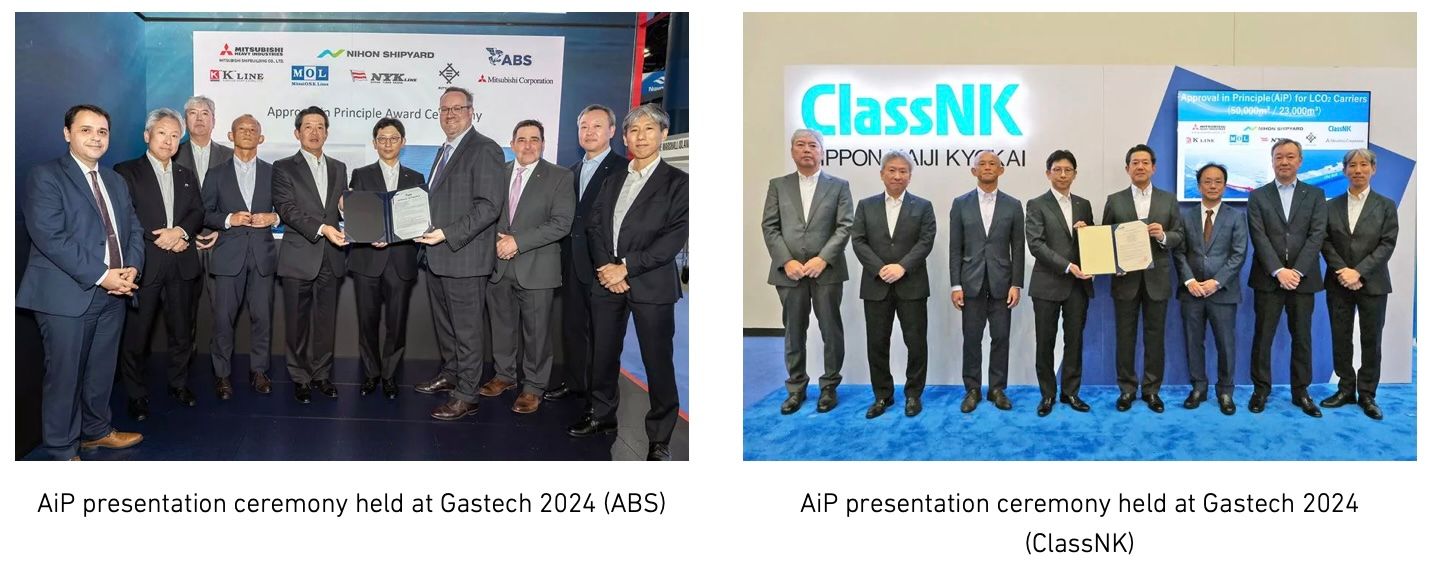TOKYO, Sept 18, 2024 - (JCN Newswire) - Mitsubishi Shipbuilding Co., Ltd., a part of Mitsubishi Heavy Industries (MHI) Group; Kawasaki Kisen Kaisha, Ltd. ("K" LINE); Mitsui O.S.K. Lines, Ltd. (MOL); Nihon Shipyard Co., Ltd., a joint venture for ship design and sales between Imabari Shipbuilding Co., Ltd. and Japan Marine United Corporation; Nippon Yusen Kabushiki Kaisha (NYK Line); Mitsui & Co., Ltd.; and Mitsubishi Corporation have jointly acquired Approval in Principle (AiP)(1) from the American Bureau of Shipping (ABS) and Nippon Kaiji Kyokai (ClassNK) for two types of low-pressure type liquefied CO2 (LCO2) carriers under their joint development. A presentation ceremony took place on September 17 at the George R. Brown Convention Center, the venue of Gastech 2024, a major international conference on global energy and environmental issues, including natural gas, liquefied natural gas (LNG), and hydrogen, held in Houston, Texas.

Demand for LCO2 carriers is expected to grow in tandem with various CCS (Carbon dioxide Capture and Storage) projects involving the transportation of CO2 captured in Japan to storage sites located oversea. Recently, Mitsubishi Shipbuilding, Nihon Shipyard, Mitsui & Co. and Mitsubishi Corporation have collaborated to achieve standardization of LCO2 carriers suited for use by multiple projects, and to establish a supply chain in order to build and supply LCO2 carriers consistently within Japan, which would contribute towards the realization and improvement of economic efficiency of CCS value chains. These initiatives have led to the acquisitions of two AiPs in collaboration with three major Japanese shipping companies: "K" LINE, MOL and NYK Line.
The two LCO2 carriers that received AiP certifications are low-pressure type 50,000m³-class and 23,000m³-class vessels developed for long-distance ocean voyages. The AiP certifications assume the use of appropriate cargo tank material as a replacement for the nickel steel previously considered. Additionally, post welding heat treatment (PWHT)(3), one of critical issues in establishing the cargo tank manufacturing, may be omitted by the Engineering Critical Assessment (ECA)(4) approach is included.
MHI Group is pursuing strategic measures to strengthen its business for the energy transition. Mitsubishi Shipbuilding, for its role in this initiative, efforts to contribute to the advance of the maritime industry in Japan and around the world by utilizing its shipbuilding-based marine engineering technologies in addition to conventional shipbuilding. Mitsubishi Shipbuilding will actively promote the development of LCO2 carriers and establishment of CCS value chain through collaboration with various domestic/overseas companies.
(1) Approval in Principle (AiP) indicates that the certification body has reviewed the basic design and approved it as satisfying the technical requirements and safety criteria. The assessment was conducted in accordance with the IGC Code(2) and the American Bureau of Shipping (ABS) and Nippon Kaiji Kyokai (ClassNK) classification rules applicable to vessels transporting liquefied gas in bulk.
(2) IGC Code (The International Code for the Construction and Equipment of Ships Carrying Liquefied Gases in Bulk) is an international regulation stipulating conditions to ensure the safety of vessels that transport liquefied gases (LCO2, LNG, etc.) in bulk.
(3) In post welding heat treatment (PWHT), structural materials are reheated to a set temperature after welding and held at that temperature for a specified amount of time. This process aims to lower residual stresses generated during welding and improve the quality of welding joints. PWHT is generally performed by placing structural products into a dedicated furnace. When the products are of large size, furnace size may cause bottlenecks in the manufacturing process.
(4) Engineering Critical Assessment (ECA) is a method for evaluating the safety of welded structural components. Using micro initial defects in the welding joints and the estimated stress history together with characteristics of the material, the ECA confirms that no major quality issues will occur during the product's service life.
About MHI Group
Mitsubishi Heavy Industries (MHI) Group is one of the world’s leading industrial groups, spanning energy, smart infrastructure, industrial machinery, aerospace and defense. MHI Group combines cutting-edge technology with deep experience to deliver innovative, integrated solutions that help to realize a carbon neutral world, improve the quality of life and ensure a safer world. For more information, please visit www.mhi.com or follow our insights and stories on spectra.mhi.com.